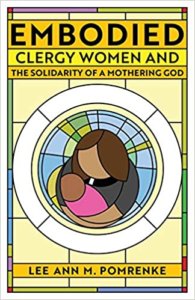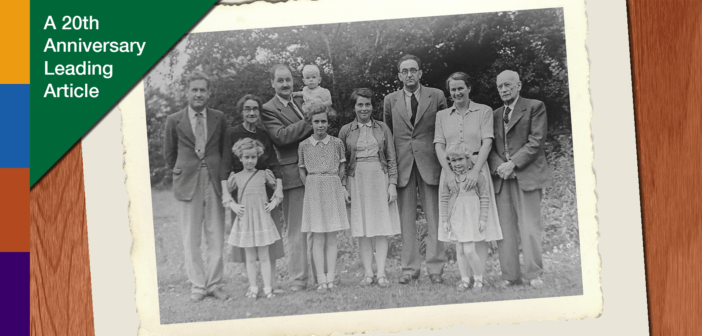Lee Ann M. Pomrenke says the beloved metaphor of church as family can stand in the way of a congregation being truly open and inclusive. The church is a movement defined by shared values, commitments, and actions, not a household family linked by a shared heritage or appearances.
To celebrate the Lewis Center’s anniversary, we are highlighting Leading Articles — some of our most popular posts of the past 20 years. We are pleased to share again this article by Lee Ann M. Pomrenke, originally published on April 6, 2021.
“This church is like a family.” We say it like it is a good thing. This sentiment is repeated in rural, suburban, and urban settings, often in smaller congregations. The phrase is intended to imply warm feelings, a sense of belonging, and mutual support in a community that knows and cares for its members. This metaphor describes how members of the congregation helped us through struggles or accepted us when the rest of the world seemed hostile. We may also be saying that our sense of belonging in the congregation is comfortable, like old patterns and habits in an ever-changing world. But congregations can resemble families in other less positive ways, too. Hard to get into. Unwilling to adapt to new ways of doing things. Or mostly interested in taking care of ourselves.
Jesus fully embraced the metaphor of family for his followers, but not in the same way we do. Jesus rebuked the very mother who birthed him for trying to make a special claim on his attention. Wow! Large crowds were traveling with him and Jesus turned and said to them, “Whoever comes to me and does not hate father and mother, wife and children, brothers and sisters, yes, and even life itself, cannot be my disciple” (Luke 14:24-26).
Considering ourselves entitled to special access to Jesus (or having our agendas carry more weight) because of our history in a congregation or some other marker of our identity is not how the Jesus Movement is meant to work. Your family history or your position as a brother or mother used to matter a great deal. But Jesus says to every person on earth that God loves them unconditionally, so claims of special privilege become a hinderance instead of a help. Followers of Jesus have to be willing to put Jesus’ mission above our own.
What makes a family?
One dimensions of being “like a family” for our congregations is that we tend to associate homogeneity with belonging. Do you ever get the sense that those who are “born into” our church family — and therefore may look or act like previous generations of its membership — are perceived to fit better than anyone who does not (new immigrants, same-sex couples, transgender persons, adoptive families, and so on)? Visual homogeneity can lull us into a false sense of comfort. We may even tiptoe around sensitive issues in order to maintain the appearance of unity. Once our real differences are uncovered, however, it can feel like a betrayal since we had assumed that we were “the same.”
Similarity might imply belonging, but it does not create it. Commitment creates belonging, in a family or a church family. We choose, over and over again, to belong to one another regardless of what comes up. Family resemblances do not make church families function any more than they strengthen household families. Opting in and putting effort into creating those bonds makes a family. Families hold together not by the fact of their common genetics but through consistent, repeated actions.
Who belongs?
A dear elderly member of one congregation I served chuckled and told me (several times) that he “only married into” that congregation, 65 years prior when he married his wife. Imagine still defining yourself as an outsider after all that time. Perhaps we ought to ask ourselves if the confirmation photos on the wall or the ways we talk about our traditions are perpetuating the impression that one has to be born into this congregation to ever fully belong.
The relationships within a healthy congregation have to be more fluid than a family. It should not be so difficult to get into and establish belonging. A family does not stay together by standing still but by moving and changing as individuals change. The definition of who belongs in our church family also needs to be semi-porous and determined by our values, not simply our heritage. If you are seeking to do God’s will or are vulnerable and need our care, we should consider ourselves related.
Embracing others as family
Congregations must actively fight homogeneity and prejudices. While families reward assimilation and individuals develop their own roles to survive in a family system, Christians will only become Jesus’ body in the world by diversifying our experiences and being changed by folks outside of our circles. Those outside of “the family” are key to the church becoming who God would have us be. We will need to educate ourselves and actively reject the “family-like” function of congregations perpetuating discrimination and prejudice.
Many of us have never considered that to embrace others as family will involve hearing about how we or others like us in the church have ignored or excluded them in the past. This is why confession and forgiveness are a core part of our life together. The struggles of our siblings in Christ are our struggles and the understand of God and God’s people that emerge from these lived experiences can open up our “family’s” theology in surprising ways. In our globally connected world, the notion that “we don’t need to address that because we don’t have any of those people here” has never been less true, regardless of the specific issues. Our claim to be part of the family of God falls flat if we operate on theology that only acknowledges or offers grace for some of us.
Church does not have to look like what we once knew for it to be the body of Christ on earth. In fact, as we reinvent church for generations who were burned by organized congregations or who have simply had little contact with organized congregations, it makes sense to start with people’s spiritual hunger rather than traditional models. The church is a movement, not a household family. If we want to be part of it, we have to re-create church on our feet.
 This article is condensed from Embodied: Clergy Women and The Solidarity of a Mothering God (Church Publishing Incorporated, 2020) by Lee Ann M. Pomrenke. Used by permission. The book is available at Church Publishing, Cokesbury, and Amazon.
This article is condensed from Embodied: Clergy Women and The Solidarity of a Mothering God (Church Publishing Incorporated, 2020) by Lee Ann M. Pomrenke. Used by permission. The book is available at Church Publishing, Cokesbury, and Amazon.
Related Resources
- The New Church Family by Ann A. Michel
- 50 Ways to Welcome New People, a free resource from the Lewis Center
- 3 Characteristics of Genuine Christian Hospitality by Philip J. Brooks
Photo by Annie Spratt from Unsplash






